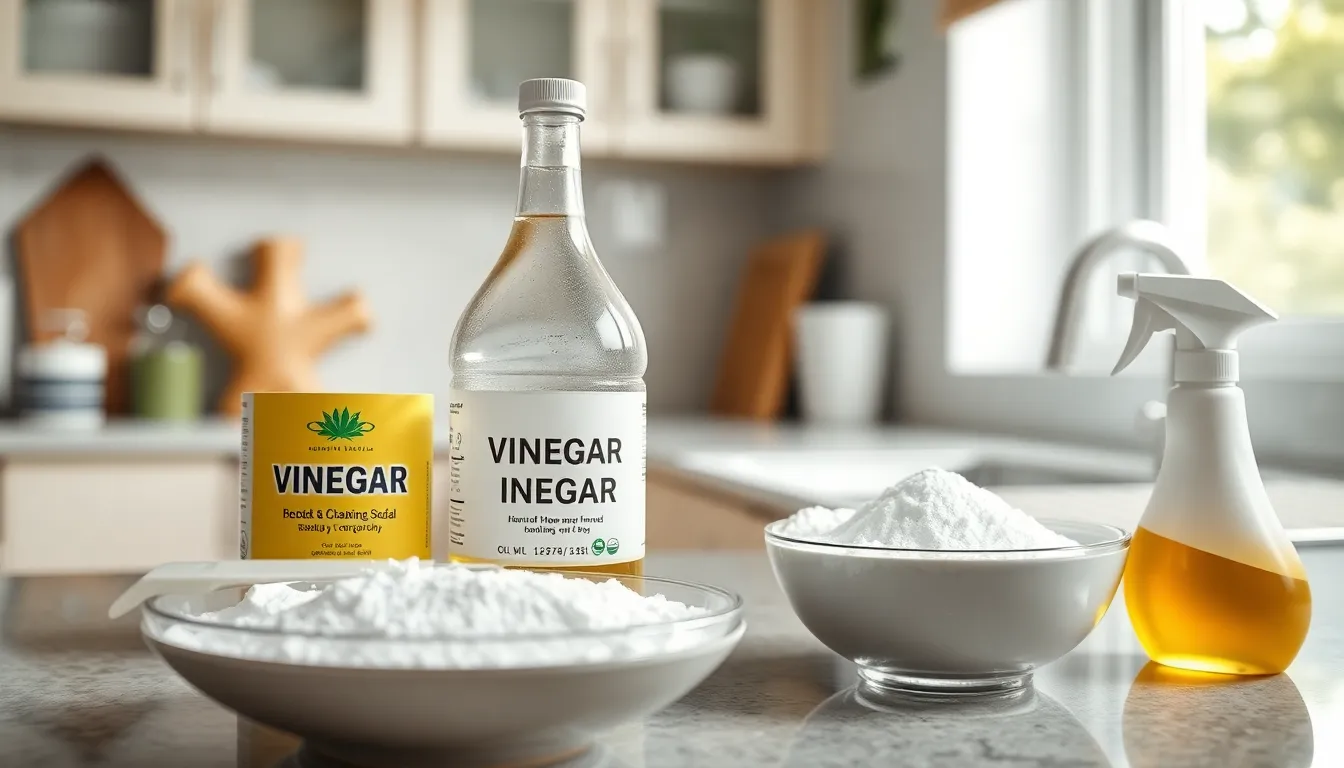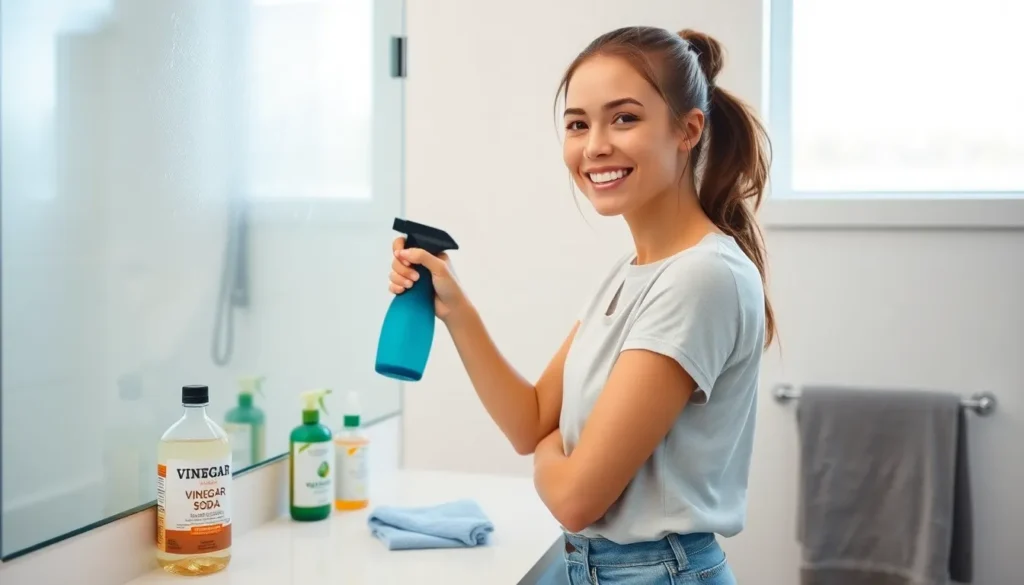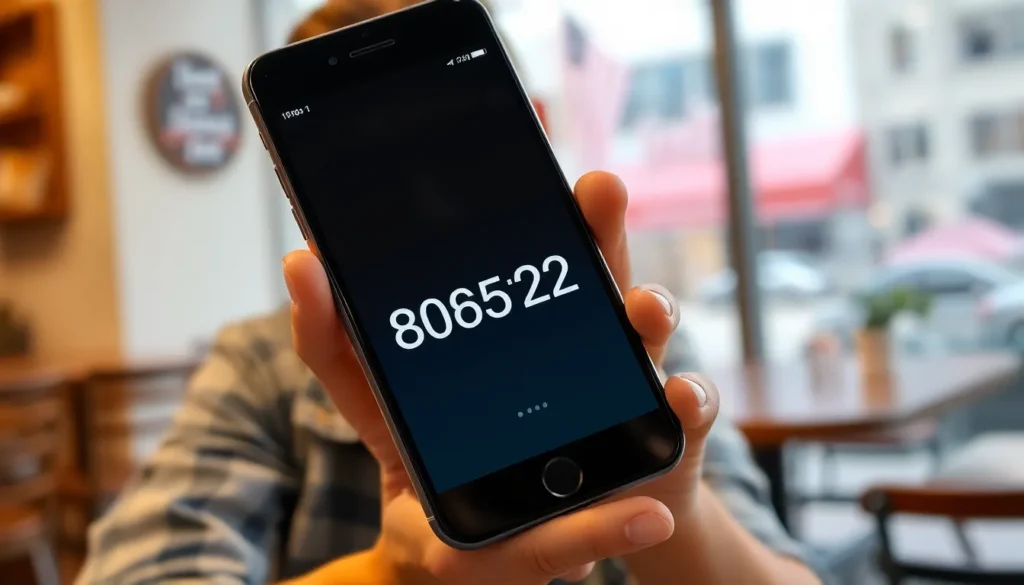Table of Contents
ToggleHard water stains can turn any shiny surface into a dull disappointment. Those pesky spots seem to have a vendetta against your faucets, shower doors, and countertops, making them look like they’ve survived a battle with a sandpaper factory. But fear not! With the right tricks up your sleeve, you can reclaim that sparkle and send those stains packing.
Understanding Hard Water Stains
Hard water stains frequently dull the shine of surfaces like faucets, shower doors, and countertops. These unsightly marks stem from mineral buildup that occurs during everyday use.
What Are Hard Water Stains?
Hard water stains appear as cloudy or white residues on surfaces. Calcium and magnesium deposits contribute to their formation after water evaporates. They often accumulate in areas with high water usage and low drainage. Homeowners often find these stains particularly stubborn to remove, leading to frustration during cleaning routines.
Why Hard Water Stains Occur
Hard water stains occur due to the presence of minerals in tap water. Water travels through pipes and carries these minerals, leaving deposits behind upon evaporation. Increased exposure to hard water, like in showers or sinks, elevates the likelihood of stain formation. Areas with poor ventilation also tend to exacerbate the problem as moisture lingers longer. Understanding the causes aids in targeting effective cleaning strategies.
Effective Methods for Cleaning Hard Water Stains

To eliminate hard water stains effectively, various methods exist. Options range from natural solutions to commercial products, each suitable for different surfaces.
Natural Cleaning Solutions
Vinegar proves highly effective against hard water stains. Its acidic nature breaks down mineral deposits without damaging surfaces. Baking soda offers another option; it acts as a gentle abrasive combined with vinegar for enhanced cleaning power. Lemon juice can also serve as an alternative, utilizing its acidity to dissolve stains while leaving a fresh scent. When applying these natural solutions, patience remains key, as letting them sit for a few minutes beforehand can improve their effectiveness. Rinsing the area afterward ensures no residue remains.
Commercial Cleaning Products
Specialty cleaners specifically designed for hard water stains provide targeted solutions. Look for products with citric acid or sulfamic acid as primary ingredients. These formulations directly tackle mineral buildup while often being safe for various surfaces. Following the manufacturer’s instructions ensures optimal results, as dilution ratios and application methods vary. Scouring pads suitable for specific surfaces enhance the cleaning process, but care is essential to avoid scratching. Frequent use of commercial products can simplify maintenance, preventing stains from accumulating over time.
Preventing Hard Water Stains
Preventing hard water stains requires consistent effort and specific strategies. Incorporating the right maintenance tips and solutions improves results.
Routine Maintenance Tips
Establishing a regular cleaning routine minimizes mineral buildup. Wiping down surfaces after each use helps remove moisture and prevents stains from forming. Utilizing a squeegee on shower doors or tiles removes water residue, significantly reducing hard water stains. Frequent inspections of areas prone to staining, like faucets and sinks, allow for early detection. Employing microfiber cloths provides a gentle yet effective cleaning method. Setting reminders for weekly cleanings ensures surfaces remain shiny and clear.
Water Softening Solutions
Water softening systems effectively reduce hard water minerals. Installing a water softener at the home’s main water supply converts hard minerals into softer ones, drastically reducing stains. Using additives in laundry and dishwashing can also soften water, making it easier on surfaces. Portable water softeners offer flexibility for specific needs, especially in rentals or smaller spaces. Regularly checking and maintaining these systems ensures optimal performance. Understanding the benefits of water softening will enhance the longevity and appearance of fixtures and surfaces throughout the home.
Tips for Different Surfaces
Effective cleaning methods vary by surface when tackling hard water stains.
Cleaning Hard Water Stains on Glass
To restore clarity to glass surfaces, combine equal parts vinegar and water in a spray bottle. Spray the solution on the stained area and let it sit for five to ten minutes. Afterward, gently scrub with a microfiber cloth or non-abrasive sponge to lift the minerals. Rinse thoroughly with water to remove any residue. This method works well for shower doors and windows. For heavier buildup, consider using a commercial glass cleaner specifically designed to eliminate hard water stains.
Cleaning Hard Water Stains on Faucets and Fixtures
For faucets and fixtures, start by creating a paste from baking soda and water. Apply the paste directly to the stained surface and gently rub with a soft cloth. After a few minutes, rinse with water to reveal a polished finish. Another option includes soaking a cloth in vinegar and wrapping it around the faucet for about 15 minutes. This solution loosens mineral deposits effectively. Always dry the fixtures with a microfiber cloth afterward to prevent new stains.
Cleaning hard water stains doesn’t have to be a daunting task. With the right techniques and products, anyone can restore the shine to their surfaces and eliminate those stubborn deposits. Whether opting for natural solutions like vinegar and baking soda or using specialized commercial cleaners, effective results are attainable.
Establishing a regular cleaning routine and utilizing preventive measures can significantly reduce the likelihood of future stains. By incorporating these strategies into daily habits, maintaining a spotless home becomes much easier. With patience and consistency, anyone can keep their fixtures and surfaces looking their best.




